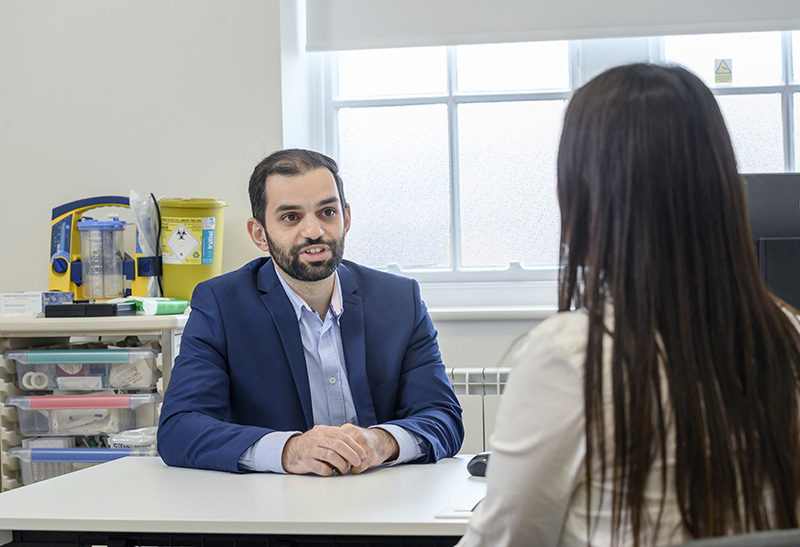Contents
GORD

Gastro-Oesophageal Reflux Disease (GORD) is a chronic digestive condition where stomach acid repeatedly flows back into the oesophagus, leading to discomfort and potential long-term complications. If you frequently experience heartburn, acid reflux, or difficulty swallowing, our expert team at The New Foscote Hospital is here to help with fast, effective diagnosis and treatment.
What is GORD?
GORD occurs when the lower oesophageal sphincter (LES)—the muscle responsible for keeping stomach acid from rising—weakens or relaxes too frequently. This allows stomach acid to irritate the oesophagus, causing persistent discomfort, inflammation, and sometimes more serious complications such as oesophageal ulcers or Barrett’s oesophagus.
Common Symptoms of GORD
GORD symptoms can vary in severity and frequency, but common signs include:
- Frequent heartburn – A burning sensation in the chest, especially after eating or at night
- Acid reflux – A sour or bitter taste due to stomach acid rising into the throat or mouth
- Difficulty swallowing (dysphagia) – A sensation of food getting stuck in the throat
- Chronic cough or throat irritation – Often worse at night or after meals
- Hoarseness or sore throat – Caused by prolonged acid exposure
- Regurgitation of food or liquid – A feeling of food coming back up unexpectedly
If you’re experiencing persistent or worsening symptoms, it’s essential to seek medical advice to prevent long-term damage to your oesophagus.
Diagnosing GORD
Accurate diagnosis is crucial for effective treatment. Our hospital provides advanced diagnostic tests to assess acid reflux severity and identify potential complications:
- Endoscopy (Gastroscopy) – A thin, flexible camera examines the oesophagus and stomach for signs of irritation or damage.
- pH Monitoring Test – Measures acid levels in the oesophagus over 24 hours to track reflux episodes.
- Oesophageal Manometry – Assesses muscle function in the oesophagus to check for swallowing issues.
- Barium Swallow X-Ray – A contrast X-ray highlights abnormalities in the oesophagus and stomach.
Our specialists will recommend the most suitable test based on your symptoms and medical history to ensure an accurate diagnosis.
Treatment Options
GORD treatment focuses on reducing symptoms, preventing complications, and improving your quality of life. We offer a range of personalised treatments at The New Foscote Hospital, including:
1. Lifestyle & Dietary Modifications
- Certain lifestyle adjustments can significantly reduce GORD symptoms, including:
- Eating smaller, more frequent meals instead of large portions
- Avoiding trigger foods such as spicy, acidic, or fatty foods
- Not lying down immediately after eating
- Maintaining a healthy weight to reduce pressure on the stomach
- Keeping the head elevated while sleeping
2. Medication-Based Treatment
- For more persistent cases, medications can effectively control acid production and protect the oesophagus:
- Antacids – Provide fast relief by neutralising stomach acid
- Proton Pump Inhibitors (PPIs) – Reduce acid production and allow healing of the oesophageal lining
- H2 Receptor Blockers – Lower stomach acid levels to prevent symptoms
- Prokinetics – Improve digestion and help prevent acid reflux
3. Advanced Treatments & Surgical Options
If lifestyle changes and medication do not provide relief, minimally invasive procedures may be recommended:
- Endoscopic Therapies – Strengthen the lower oesophageal sphincter to prevent acid reflux
- Laparoscopic Fundoplication (Nissen Fundoplication) – A surgical procedure to reinforce the barrier between the stomach and oesophagus
Our consultants will discuss all treatment options with you to ensure the best approach for your condition.
Arranging To Visit A Private GP

If you are struggling with GORD symptoms, our private GP service offers fast access to expert care, with same-day appointments often available.
- No need to be registered with the hospital
- Direct billing available for insured patients
- Specialist referrals for further investigations and treatment
Private GP Consultation Fee: £100 for a 30-minute appointment. Additional costs for tests, scans, or specialist referrals will be clearly discussed upfront.
28 March 2025


